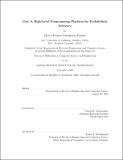Gen : a high-level programming platform for probabilistic inference
Author(s)
Cusumano-Towner, Marco Francis.
Download1227518338-MIT.pdf (7.579Mb)
Alternative title
High-level programming platform for probabilistic inference
Other Contributors
Massachusetts Institute of Technology. Department of Electrical Engineering and Computer Science.
Advisor
Vikash K. Mansinghka.
Terms of use
Metadata
Show full item recordAbstract
Probabilistic inference provides a powerful theoretical framework for engineering intelligent systems. However, diverse modeling approaches and inference algorithms are needed to navigate engineering tradeoffs between robustness, adaptability, accuracy, safety, interpretability, data efficiency, and computational efficiency. Structured generative models represented as symbolic programs provide interpretability. Structure learning of these models provides data-efficient adaptability. Uncertainty quantification is needed for safety. Bottom-up, discriminative inference provides computational efficiency. Iterative "model-in-the-loop" algorithms can improve accuracy by fine-tuning inferences and improve robustness to out-of- distribution data. Recent probabilistic programming systems fully or partially automate inference, but are too restrictive for many applications. Differentiable programming systems are also inadequate: they do not support structure learning of generative models or hybrids of "model-in-the-loop" and discriminative inference. Therefore, probabilistic inference is still often implemented by translating tedious mathematical derivations into low-level numerical programs, which are error-prone and difficult to modify and maintain. This thesis presents the design and implementation of the Gen programming platform for probabilistic inference. Gen automates the low-level implementation of probabilistic inference algorithms while remaining flexible enough to support heterogeneous algorithmic approaches and extensible enough for practical inference engineering. Gen users define their models explicitly using probabilistic programs, but instead of compiling the model directly into an inference algorithm implementation, Gen compiles the model into data types that encapsulate low-level inference operations whose semantics are derived from the model, like sampling, density evaluation, and gradients. Users write their inference application in a general-purpose programming language using Gen's abstract data types as primitives. This thesis defines Gen's data types and shows that they can be used to compose a variety of inference techniques including sophisticated Monte Carlo algorithms and hybrids of Monte Carlo, variational, and discriminative techniques. The same data types can be generated from multiple probabilistic programming languages that strike different expressiveness and performance tradeoffs. By decoupling probabilistic programming language implementations from inference algorithm design, Gen enables more flexible specialization of both, leading to performance improvements over existing probabilistic programming systems.
Description
Thesis: Ph. D., Massachusetts Institute of Technology, Department of Electrical Engineering and Computer Science, September, 2020 Cataloged from student-submitted PDF of thesis. Includes bibliographical references (pages 221-231).
Date issued
2020Department
Massachusetts Institute of Technology. Department of Electrical Engineering and Computer SciencePublisher
Massachusetts Institute of Technology
Keywords
Electrical Engineering and Computer Science.